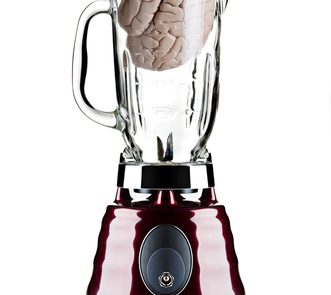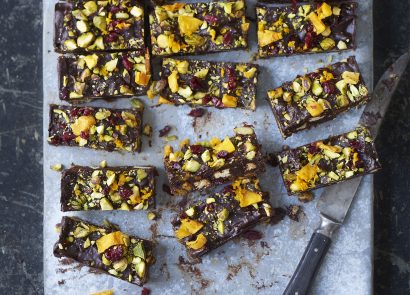From delicious healthy recipes to the best nutritional advice, we guide you through what should – and shouldn’t – be on your plate this month
Whether it’s believing that a dairy-free diet leads to a calcium deficiency or that fresh food is always better than frozen, there are many things we take as fact – but how true are they really? We called in the experts to delve into the science behind these 10 common food myths to discover what’s real and what’s just an old wives’ tale, so you can be secure in what you’re serving up for yourself and your family.
The myth
A dairy-free diet can lead to a calcium deficiency
The facts
“This is a common one among those who are critical of the vegan diet, although less is said about those that have to give up dairy for reasons of allergy or intolerance,” says Rob Hobson, Healthspan registered nutritionist (healthspan.co.uk). “While dairy foods are one of the richest sources of calcium, this mineral can be gleaned from many other foods. The recommended intake for adults aged 19-64 years old is 700mg per day, which can be obtained from plant foods, including tofu, almonds, dark green leafy vegetables, sesame seeds, tahini and fortified plant-milks.”
The myth
You should avoid eating too much fruit because it contains sugar
The facts
“Of course, fruit does increase your blood-sugar levels, but what it provides you with in terms of vitamins, minerals, antioxidants and fibre far outweigh this,” says personal trainer and nutrition coach, Martin Hamer, health and fitness tutor at The Training Room (thetrainingroom.com). “What’s more, in some fruits, the fibre will slow the digestion process and help to keep more stable blood sugars, so fruit often doesn’t affect insulin levels as much as you might think. Also, it’s very difficult to overeat fruit and therefore consume excess energy which leads to fat gain and other health issues. If you eat 15 apples per day – as an extreme example – this will have a negative effect on your body, but many people still aren’t getting their daily five fruit and veg, so most people won’t consume enough fruit for the sugars to become an issue. Unlike fatty foods (e.g. biscuits and chocolate bars), which might only satisfy your sugar craving for a short period, fruit gives you that sugar fix while providing the fibre that keeps you feeling fuller for longer – helping to avoid repeat snacking. In conclusion, my advice would be to continue eating fruit as part of a healthy, balanced diet.”
The myth
Humans need red meat in their diet for protein
The facts
“This is a total myth as there are many dietary sources of protein,” Rob tells us. “Protein is comprised of amino acids and some of these are regarded as being essential. Red meat contains all of the essential amino acids, as do other animal proteins, such as poultry and fish. Not all plant foods contain all the essential amino acids, but those that do, include quinoa, buckwheat (such as soba noodles), hemp seeds, chia seeds, tofu, tempeh, edamame beans, Quorn (vegan products in the range) and Ezakiel bread (from Jerusalem, made using beans, lentils and grains). Other plant sources rich in protein include beans, pulses and lentils, but even grains and certain vegetables offer a good source for non-meat eaters.”
The myth
Oranges are the best source of vitamin C
The facts
“Oranges have gained a reputation as being high in vitamin C and, although they do contain this nutrient, they are not the richest source,” Rob says. “Foods such as guava, sweet peppers and kiwi fruit contain almost twice as much vitamin C. Other foods richer in this nutrient than oranges include broccoli, peas and papaya.”
The myth
Healthy eating costs more
The facts
“These days, we often think of health foods as costly, due to the price of meat, artisan foods and the ever-popular superfood smoothies,” says nutritionist and fitness coach Helena Hill. “Don’t be fooled by expensive trends and marketing ploys. Healthy eating doesn’t need to be expensive, fancy or complicated. Just by simply increasing your daily intake of fruit and vegetables you can improve your diet and overall health without breaking the bank. Tinned pulses such as beans, lentils and peas are healthy, nutritious and filling. They can also work well in place of meat. Think: kidney bean chilli or salad – you can buy a tin of kidney beans at your local supermarket for as little as 30p. Frozen vegetables are a great option, often cheaper than fresh vegetables and are stored for longer. Examples include cauliflower and broccoli, which are high in fibre, vitamin C, potassium, among other nutrients, and can be added to stews and soups. Carrots are a tasty, versatile vegetable. They’re high in vitamin C, beta-carotene and fibre. Not only do they make a great, crunchy snack when eaten raw, but they’re also a good addition to salads, soups, roasts and casseroles.”
The myth
Organic food is better for you
The facts
“This is a very contentious topic, but the benefits are actually yet to be fully proven,” explains Rob. “While organic foods are free of hormones, antibiotics and contain fewer pesticide residues, their nutritional value appears to be similar either way. Organic foods come with a price tag and those people without the money to spend should not view non-organic as being in any way less good for them.”
The myth
Eating fresh food is better than tinned or frozen
The facts
“Fresh foods are always going to be the best option but that doesn’t mean tinned or frozen are not a good option,” says Rob. “Water-soluble vitamins, such as vitamin C, are easily destroyed by heat, so tinned fruits and vegetables may be lower in this nutrient. Tinned fruits and vegetables are still a good source of fibre and, in some cases, the tinning process may make this nutrient more absorbable in the body. Some antioxidants, such as lycopene in tomatoes, become more bioavailable when processed. Frozen vegetables and fruits are done so very shortly after picking, so they still contain high amounts of the nutrients found in them. This makes frozen fruits and vegetables a really good option and are great to use in smoothies or when added to dishes like curries. Tinned pulses are also massively nutritious and contain high amounts of calcium, zinc, iron and fibre. The other benefit of tinned and frozen is that they offer an economical way to achieve your five-a-day.”
The myth
Eggs are bad for cholesterol
The facts
“New guidance on eggs says that we are OK to eat as many as we like (although this is still limited for people with high cholesterol),” Rob reveals. “It was considered that the high cholesterol of eggs was a cause of heart disease. However, it’s now understood that dietary cholesterol (found naturally in eggs) has little impact. Cholesterol is controlled by the liver and it is saturated and trans fats in the diet that influence cholesterol levels which are linked to heart disease.”
The myth
Chocolate is bad for you
The facts
“Chocolate is never going to be considered a health food as it is high in sugar,” says Rob. “However, this doesn’t mean there aren’t a few health benefits, but this depends on the quantity of cacao in the product. Raw cacao is the key ingredients in chocolate and is a rich source of magnesium, as well as being a source of zinc, iron, potassium and copper. You’ll also find flavanol polyphenols in cacao which help to protect the body from disease. If you are looking to eat chocolate, then a few squares of good-quality dark chocolate is your best bet.”
The myth
Eating fats will make you fat
The facts
“Fat in the diet does contain the most calories which means too much may cause you to put on weight, especially as many high-fat foods are also loaded with sugar in the case of sweet snacks, pudding and convenience foods,” Rob tells us. “However, this is a case of excess calories more than the fat itself, as overeating carbs or protein can cause the body to store fat. Fat is actually very satiating, meaning it helps to keep you full when added to a meal. We should be eating mostly healthy fats which help to reduce the risk of heart disease and reduce inflammation in the body. Fats can also be utilised to help people to lose weight as part of the ketogenic diet when eaten in place of carbs. The bottom line is, fats should be healthy varieties and eaten alongside carbs and protein to within our daily calorie requirement.”





















